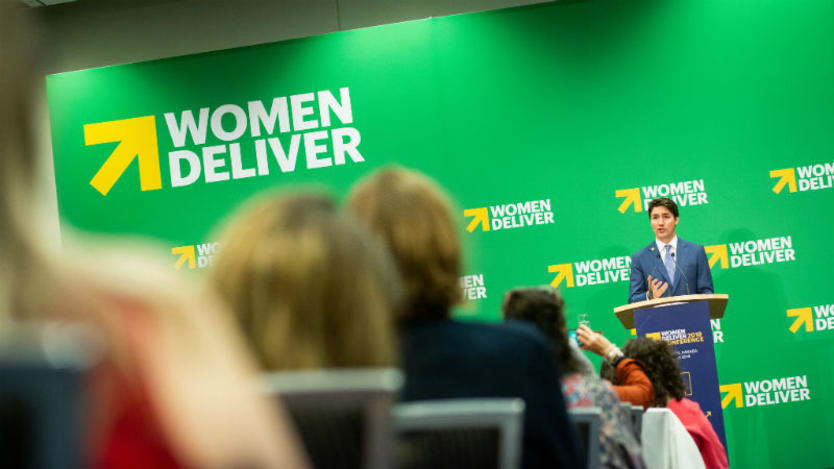
The African Union suspends Sudan, Ebola vaccine production hits a roadblock, and U.S. abortion policies reverberate. This week in development:
Inside the Vancouver Convention Center and spilling out to venues around town, Women Deliver 2019 welcomed more than 8,000 attendees from around the world to dive into conversation about barriers to and opportunities for women’s equality. The event saw a flurry of announcements and reports, including Canada’s pledge of C$700 million annually ($523 million) — up from current contribution of C$400 million — to women and girls’ sexual and reproductive health in a move that UNFPA Executive Director Natalia Kanem told Devex “is going to help hundreds of millions of girls meet their aspirations.” Calls for fair pay for women on the frontlines of global health and calls to close the unpaid care gap took place against the backdrop of Equal Measure 2030’s SDG Gender Index, which revealed that no country in the world is on track to achieve gender equality by 2030. Melinda Gates, co-chair of the Bill & Melinda Gates Foundation, said the index “should serve as a wake-up call to the world.”
The African Union has suspended Sudan in response to a deadly crackdown by military forces on civilian protesters on Monday that left more than 100 people dead and more than 500 injured. The regional body said on Twitter that the establishment of a civilian-led transitional authority is now “the only way to allow the Sudan to exit from the current crisis.” Since a coup in April ended the 30-year rule of former President Omar al-Bashir, civilian representatives have tried to negotiate a power-sharing agreement with the Transitional Military Council, which is led by Sudan’s generals and backed by Saudi Arabia, the United Arab Emirates, and Egypt. On Monday any hopes of a peaceful, mutually agreeable resolution appeared to vanish, after military forces destroyed a protest site, opened fire on civilians, and dumped their bodies in the Nile river. On Wednesday, the United Nations announced it was temporarily removing some of its civilian staff from the country. Internet access inside Sudan has been intermittently blocked, and security forces closed the Khartoum offices of Al Jazeera and withdrew work permits from the Qatar-based media outlet’s correspondents. U.S. Agency for International Development Administrator Mark Green called for an end to attacks on civilians and medical personnel and voiced U.S. support for civilian-led government.
As USAID rolls out additional guidance related to the Trump administration’s attempt to block support for abortion services, the consequences of those policies are coming more clearly into view. In a letter last month accompanying an update to the USAID standard provisions, the agency made two expected clarifications, providing some discretion when implementers are found in violation and some clarity about what it means to provide technical assistance. But it failed to include guidance about how they should operationalize the expanded “Protecting Life in Global Health Assistance” policy requirements related to how implementers must guarantee the compliance of subgrantees. A new report from the International Women’s Health Coalition presented the results from more than 170 interviews with civil society organizations, health service providers, and government agencies in Kenya, Nepal, Nigeria, and South Africa. Among other challenges, the report found that in Kenya, two women died following self-induced abortions after a local sex worker organization signed the policy and stopped providing abortion services and referrals. Devex’s Deputy News Editor Jessica Abrahams traveled to Mozambique to document how U.S. policy restrictions have undermined the country’s recent success in reducing teenage pregnancy.
Health responders battling the Ebola virus have a new enemy: regulatory delays. While the number of Ebola cases in eastern Democratic Republic of Congo has now climbed past 2,000, the effort to contain the outbreak is running up against policy and logistical challenges on multiple fronts. On Tuesday, Centers for Disease Control and Prevention Director Robert Redfield told lawmakers that the facility that is supposed to be manufacturing the Ebola virus vaccine has yet to secure a validation to allow production to continue. Merck, the vaccine’s manufacturer, closed its facility in Pennsylvania and relocated the operation to Germany, but the new plant has not passed the necessary tests, Redfield said. The CDC director expects that health responders will exhaust the current global stockpile of roughly 145,000 vaccine doses as they attempt to expand the vaccination campaign, and he predicted a “six to 12-month lag before there’s adequate vaccine supply.” At the same time, USAID is still waiting for a decision from the White House about whether President Donald Trump will grant a waiver for DRC to allow additional assistance to the country, despite restrictions imposed by a law aimed at preventing trafficking in persons.
And one more thing: Devex Editor-in-Chief Raj Kumar’s new book, “The Business of Changing the World,” was named the World Economic Forum’s book of the month for June.








